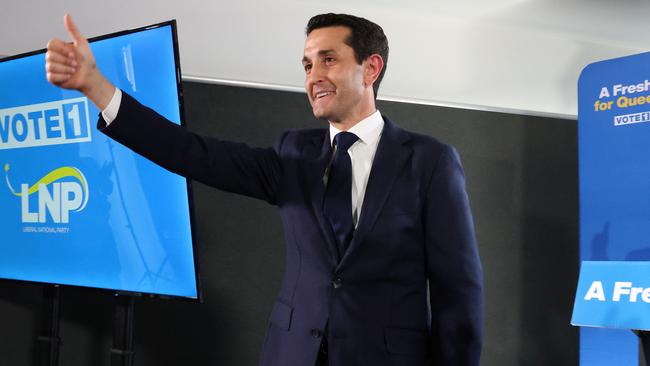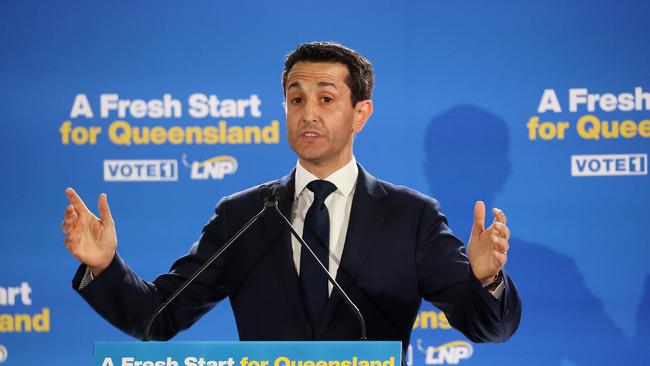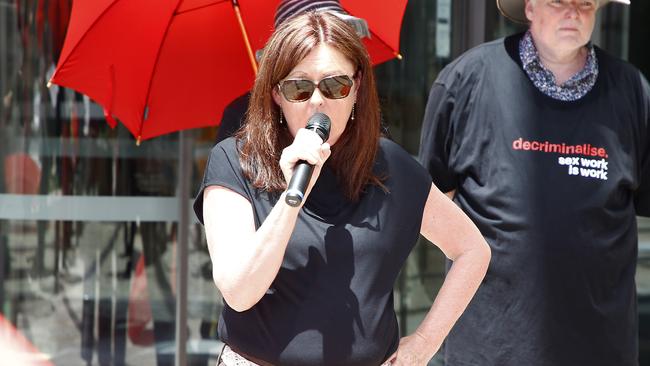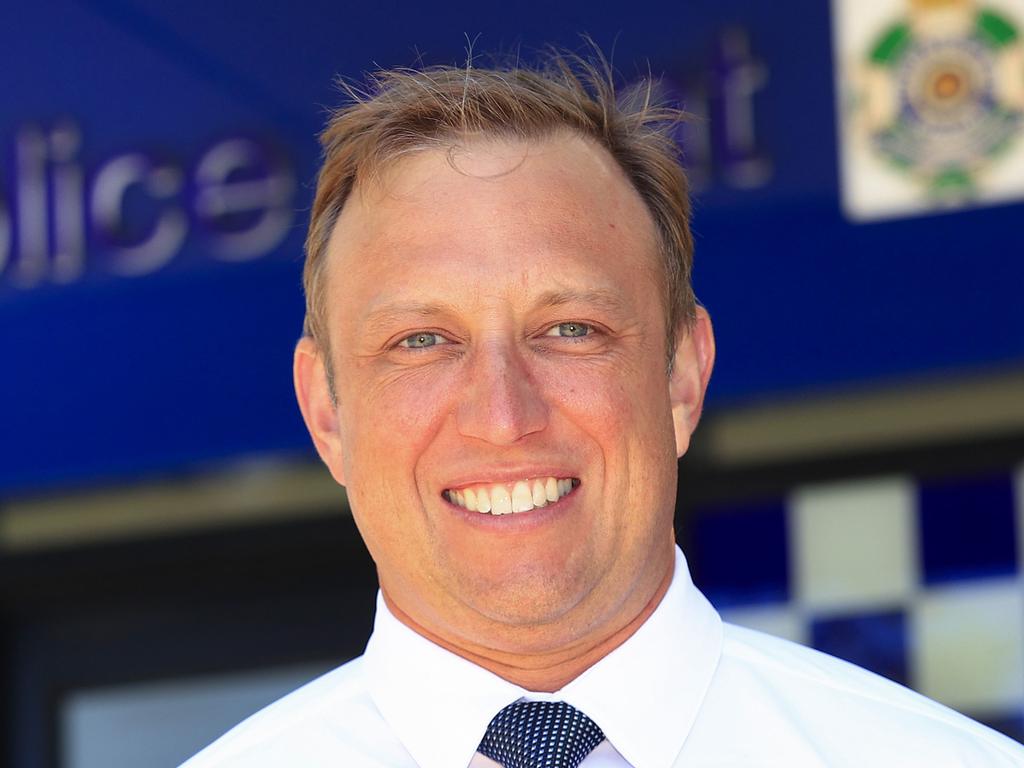Unions put David Crisafulli on notice: $1bn election-eve pay fight
Queensland’s top union leader has warned the would-be premier an incoming LNP government faces strike action if it doesn’t deliver more than $1bn in unbudgeted pay rises to nurses, teachers and police.

Queensland’s top union leader has put David Crisafulli on notice that an incoming Liberal National Party government will face strike action if it doesn’t deliver more than $1bn in unbudgeted pay rises to the state’s nurses, teachers and police.
The warning came as Mr Crisafulli, who successive polls predict will win Saturday’s state election, officially launched the LNP campaign on Sunday centring his pitch on driving down crime rates and victim numbers.
Vowing to introduce minimum stints in isolation for uncooperative youth detainees and revoking television privileges for those who refuse to attend school, Mr Crisafulli declared crime as the “defining issue” of the Queensland election campaign.
To a small gathering in Labor’s heartland of Ipswich, west of Brisbane, Mr Crisafulli avoided any mention of comprehensive economic reform or tackling the state’s skyrocketing debt under the three-term Labor government.
The state’s total debt will hit $172bn by mid-2028, with The Australian this month revealing that Queensland’s public service wage bill has exploded by more than 75 per cent since Labor was elected in 2015.
Mr Crisafulli and Queensland Labor premier Steven Miles have refused to commit to controlling the ballooning bureaucracy wage bill with both announcing policies in the campaign requiring increases in frontline workers.
Employee expenses have surged from $19.96bn to $35.22bn this year, for the extra 57,000 full-time positions in the public service since Annastacia Palaszczuk was elected in January 2015.
Queensland Council of Unions general secretary Jacqueline King last week wrote to Mr Crisafulli saying the labour movement will be seeking pay rises above the annual 2.5 per cent for the next three years that were locked into Labor’s June budget and endorsed by the LNP.
Taxpayers will be slugged an extra $352m a year for every percentage point salary rise above 2.5 per cent, with enterprise bargaining agreements to be in place by April, next year for the nurses and by July for teachers and police.
The Queensland Nurses and Midwives Union is already pushing for a wage increase of more than 3.8 per cent annually, in order to keep pace with inflation.
Ms King said Queensland needed to compete with enterprise bargaining agreements in NSW and Victoria, which had delivered pay rises of 16 per cent and 28.4 per cent for nurses, respectively, over the next four years.
She warned that workers will go interstate for better pay and conditions.
“We will campaign and take protected industrial action, whether it is Labor or the LNP in government, to achieve a good outcome,’’ she told The Australian.
“The members are hungry for a fight.”

Ms King, who heads the peak body of unions representing 400,000 Queenslanders, said she had written to Mr Crisafulli last week, seeking a commitment to back the push for “decent wages” after already lobbying the Labor government, and with nurses beginning their EBA negotiations before the campaign.
“He can’t ignore it, otherwise we won’t get the teachers, nurses and police that are needed for his policies and who the current government is already finding it hard to recruit and retain,’’ she said.
Queensland’s unions are also pushing both leaders to commit to doubling the combined parental leave for Queensland’s 260,000 public servants to 36 weeks.
Under the plan, parents would be able to access 18 weeks of government-funded paid leave. Currently the primary care giver is entitled to 14 weeks leave and one week for their partner.
Mr Crisafulli, who has ruled out forced redundancies in the public service if he is elected on October 26, has said the state needed more public servants, particularly healthcare workers and police.
But he has refused to commit to going above the budgeted 2.5 per cent wage increase.
Earlier in the campaign, Mr Crisafulli would only give an assurance that public servants would have a “good wage” and be well-resourced.
“I want an environment where unions are able to have a seat at the table and they’re treated with respect, and I commit to giving that opportunity and we will negotiate in good faith,” Mr Crisafulli said this month.
Mr Miles has left the door open going above the budgeted 2.5 per cent.
“We’ll have to see the circumstances when we set that wages policy,” he said.

Facing defeat, the third-term Labor government has centred its election campaign on cost of living, planning to rack up another $9bn in debt in the next four years to fund its commitments including free school lunches and state-owned petrol stations.
The cash-splash appears to have failed to lure back disillusioned voters, with senior Labor figures on Sunday privately conceding that retaining a majority government was “highly unlikely”, despite their beliefs that the race was tightening.
A YouGov poll, published by the Courier Mail on Saturday, put the LNP 10-points clear of Labor on a two-party preferred basis, 55 to 45. The result would translate to a bruising loss of 20 seats if the 8 per cent swing against Labor was uniform across the state.
Outlining his case for change to LNP party faithful at Sunday’s launch, Mr Crisafulli vowed to immediately rewrite the state’s juvenile justice laws that Labor relaxed a decade ago and toughen up conditions in youth detention, including revoking television privileges for uncooperative teens and making education programs mandatory.
“Queenslanders can vote for a fresh LNP team promising to deal with bullies and break enters, or a chaotic Labor Party promising to borrow for bolognese and burgers,“ he said.
“It’s time to shift the focus of youth detention from young criminals dictating the rules, to a system that focuses on discipline, respect and rehabilitation,” he said.
At the Northern Territory’s August election, the Country Liberal Party toppled the two-term Labor government after making similar promises to drive down spiralling crime rates in Darwin and Alice Springs.
Anger over the Queensland Labor government’s handling of youth crime helped deliver the LNP a surprise by-election win earlier this year in the Labor stronghold seat of Ipswich West where the government suffered a 17 per cent swing against it.
Crime firmed as a major issue across the state after the February stabbing murder of grandmother Vyleen White who was attacked in a shopping centre carpark allegedly by a 16-year-old boy who was free on bail for robbery at the time.
White’s daughter, Cindy Micallef, introduced Mr Crisafulli to the stage at Sunday’s launch and offered a full-throated endorsement of the LNP leader and his promise to introduce “adult time for adult crime” laws before Christmas.
“We all have our reasons, and our family has ours. It’s time for change,” she said.
The hardline laws would ensure youths committing murder, manslaughter, serious assault and home invasions would be sentenced as if they are adults, and have been criticised by youth advocates and lawyers.
At a brief press conference after his launch, Mr Crisafulli could not say what the minimum period of solitary confinement would be set at in youth detention, or when the government would begin a crackdown on detainees who refuse to go to school.
A surge in youth detention numbers and chronic staff shortages at the state’s three facilities has resulted in children being locked in their cells for extended periods and others held in adult watch houses for weeks.
Magistrates have previously revealed that children were being “locked in their cells” when union-backed staff ratios were not met, provided with educational packs and expected to engage in self-directed learning.
Mr Crisafulli would not say on Sunday how many extra youth detention staff would have to be employed to run compulsory education programs.
Campaigning in Brisbane on Sunday, Mr Miles accused his LNP rival of trying to motivate voters through fear with his campaign almost solely focused on justice announcements.
“The fact is, education is already mandatory in our detention facilities, and what we’ve been doing over time is increasing access to schooling and increasing access to healthcare services, because so many of the young people entering our detention system are suffering from mental health, alcohol and drug abuse issues.”





To join the conversation, please log in. Don't have an account? Register
Join the conversation, you are commenting as Logout